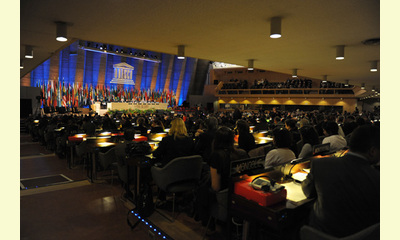|
|
Heads of State Discuss Culture of Peace at UNESCO General Conference
un article par David Adams, CPNN Coordination
UNESCO created a Leader's Forum for Heads of State in attendance at the 36th Session of its General Conference. The Forum, which took place on October 26 and 27, was devoted to the theme, “How does UNESCO contribute to building a culture of peace and to sustainable development?”

© UNESCO/M. Ravassard
click on photo to enlarge
Not since the days of Director-General Federico Mayor prior to 2000, has there been such a high-level discussion of the culture of peace. The heads of state touched on all the program areas of the culture of peace according to the landmark UN resolution of 1999.
Education for peace. Mr Kris Peeters, Minister-President of the Government of Flanders, praised in particular UNESCO's program of Associated Schools and stated that "Belgium wholeheartedly supports UNESCO’s activities related to education for peace."
Sustainable development. While all of the participants referred to this theme, as it was included in the title of the Forum, to me the most impressive remarks were those of President Johnson Toribiong of the island state of Palau in the South Pacific. "Besides the critical importance of peace to sustainable development, a more pressing issue of great concern to the pacific small island developing states is climate change, especially the threat of rising sea level caused by global warning. the ocean which has been our generous source of livelihood is now rising in rage to threaten our security and survival. some low lying islands are faced with the real possibility of being swallowed by the rising sea level. It is a tsunami of biblical magnitude in slow motion."
Human rights and democracy. Having recently come through a crisis in human rights and democracy, the President of the Republic of Cote d'Ivoire was especially eloquent, saying that for the construction of democracy we need to build a true state of rights, where the acts of each citizen are just and where human relations are ruled by laws that everyone engages to respect scrupulously.
Equality of women was stressed by Prime Minister Tillman Thomas of Grenada and President Ali Bongo Ondimba of Gabon. The latter recalled that the peaceful transition of power in Gabon was made possible by two women, one the President of the Senate and the other the President of the Constitutional Court. Finally, he paid homage to Wangari Maathai, the first African woman to win the Nobel Peace Prize and who passed away recently (see CPNN, October 3, 2011).
Tolerance and "bridges of understanding" were themes of President Boris Tadic of Serbia: " Our job is to create a harmonious symphony of mankind, to make sure we all better and more seamlessly connect, and thus enrich, the world of the 21st century—the kind of world we want our children to grow up in.
Free flow of information was also emphasized by Prime Minister Thomas who praised UNESCO’s mandate to contribute to bridging the digital divide by fostering information and communication capacity for universal access, freedom of expression and freedom of the press.
International peace and security was a theme for Prime Minister Raila Odinga of Kenya, who spoke of his country's role in the peacekeeping challenges in the horn of Africa.
See discussion on right for extensive quotations from these heads of state.
|








|
DISCUSSION
Il n'y pas encore de question liée à cet article.
* * * * *
Commentaire le plus récent:
(The following is continued from the main article listed above.)
Here are more extensive quotes from the UNESCO debate. Complete texts are available on the UNESCO website.
H.E. Mr Pal Schmitt, President of the Republic of Hungary
Sustainable development itself is one of the cardinal life-balance situations that we should achieve together. However, man is a creature who tends to be detrimental to his own destiny. Even if he is aware of the conditions: the requirements of peace, spiritual and physical health, perseverance and vision. Despite knowing the role of education, culture, arts, science and sport in achieving a complete life, man is only capable of ensuring their role with conscious collaboration.
* * * * *
H.E. Mr Kris Peeters, Minister-President of the Government of Flanders, Belgium
History has clearly shown that democracy and freedom are no eternal achievements. . ... continuation.

|
|









